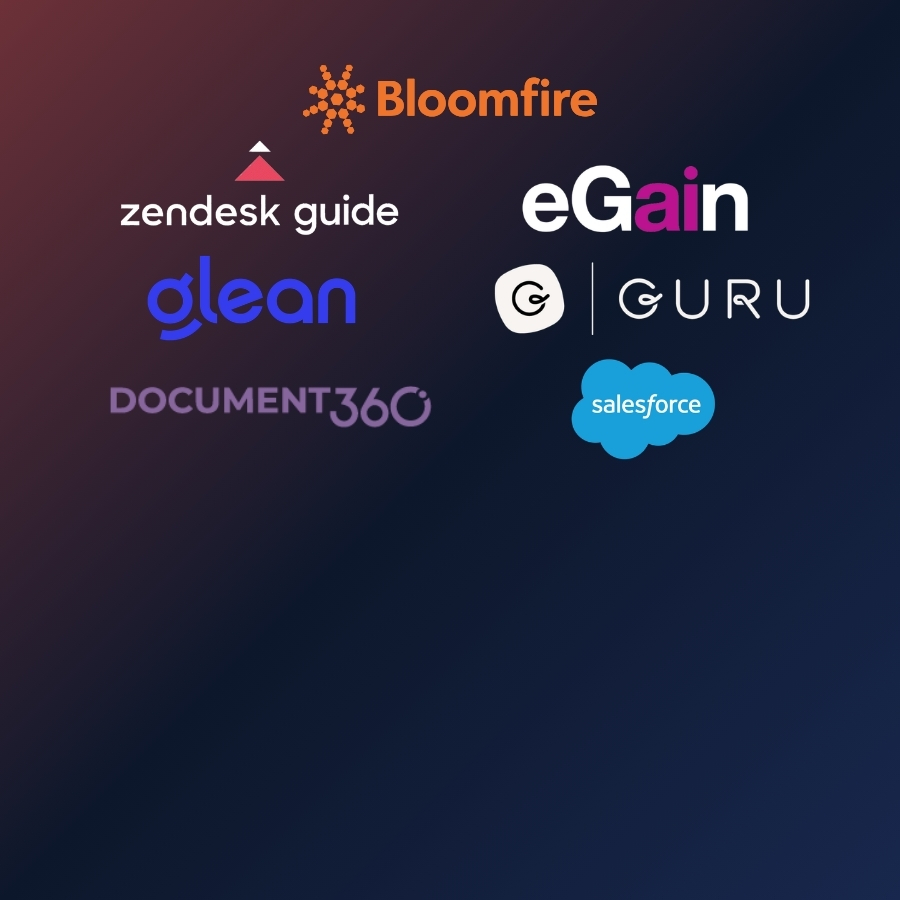How to Optimize Content for Generative AI

Many organizations are rushing to adopt generative artificial intelligence (AI) without realizing their content was never designed to be read, interpreted, and reused by machines. When information is scattered, inconsistent, or outdated, AI systems are more likely to hallucinate, surface partial answers, or reinforce confusion instead of clarity.
Optimizing content for Gen AI within a knowledge management (KM) platform is more than a technical exercise—it’s a discipline. It means intentionally structuring and governing information so AI can interpret, reuse, and expand upon it with precision and context. The result is a smarter, more trustworthy internal AI ecosystem that accelerates knowledge discovery, decision-making, and innovation.
When content is optimized for generative AI, teams see faster, more accurate answers, stronger trust in AI-assisted workflows, and better performance across both search and conversational interfaces. Read on to learn how to systematically optimize your content so generative AI can deliver the clear, consistent, and high-impact experiences your audiences expect.
What is Generative AI, and How Does it Work?
Generative AI, in an enterprise context, is a branch of artificial intelligence that creates new content such as summaries, answers, recommendations, or drafts based on an organization’s own knowledge base and data. It learns patterns from internal documents, repositories, communications, and structured systems, then produces outputs that statistically resemble and respect that institutional knowledge.
At the core of generative AI are machine learning models—often large language models (LLMs)—that are trained or adapted to model the probability of language and meaning across your internal knowledge base. During training, these models are exposed to curated enterprise content and adjust their parameters to minimize prediction errors, while respecting access controls and governance policies. Once integrated with retrieval mechanisms, they generate grounded, context-rich responses directly from your approved, up-to-date knowledge assets.
What’s the Difference Between External and Internal Generative AI?
External and internal generative AI differ primarily in what data they use and how they are governed. Both can generate natural, fluent responses, but only one is designed to reliably reflect your organization’s specific knowledge, policies, and constraints.
- Internal: Embedded within your organization’s architecture and is grounded in your own documents, data sources, and different types of knowledge management systems.
- External: Runs on third-party infrastructure and is primarily trained on broad, publicly available data from the open internet.
In practice, internal generative AI is optimized to answer “how we do it here,” while external generative AI is better suited to generic questions and broad exploration. Effective AI strategies often combine both, using internal AI for authoritative, context-rich enterprise answers and external AI for general research and creativity.
Where can Generative AI Misstep?
Even when confined to internal systems, generative AI can produce outputs that sound confident but are factually wrong, incomplete, or misaligned with policy. These failures often stem from gaps in the underlying knowledge base, duplicated or conflicting versions of content, or weak governance over what counts as a “trusted” source.
Some common issues include:
- Content silos: If critical information is scattered across disconnected tools, teams, or repositories, AI will struggle accessing the full context it needs to answer accurately. As a result, responses are narrow, incomplete, or biased toward whichever source is most visible rather than most authoritative.
- Outdated data: Procedures, pricing, product details, or policies change, but the corresponding knowledge articles are not updated or retired. The AI continues to reference stale content, undermining trust and potentially driving noncompliant or operationally incorrect decisions.
- Version drift: Multiple versions of the same document or policy coexist with no clear canonical source or owner. The AI may ground its answer in an outdated or unofficial variant, producing guidance that conflicts with current standards and confuses users.
- AI hallucinations: Sometimes, AI models invent details such as fake citations, nonexistent laws, or fabricated events without any grounding in real data. These occur because the system is optimized to produce plausible-looking text, not to verify truth, so it fills gaps by extrapolating patterns rather than checking facts.
While generative AI is an incredibly valuable tool, it is essential to keep humans in the loop, verify important claims against trusted sources, and set clear usage boundaries for high‑stakes decisions.
Internal Generative AI Tools to Make Content Discoverable
Within a knowledge management platform, generative AI can power enterprise search, conversational assistants, in-context recommendations, and automated summaries that surface the right content for each user in the flow of work. These capabilities depend on a unified and governed knowledge base where content is machine-readable, clearly scoped, and consistently tagged with metadata and permissions.
When internal GenAI is layered on top of this foundation by using retrieval-augmented generation, semantic search, and access governance, it can deliver precise, policy-safe answers rather than generic or externally influenced responses.
6 Steps to Optimizing Content for Generative AI

Generative AI is reshaping how organizations plan, create, and distribute content, demanding a more intentional, system-aware approach. To remain reliable and valuable in AI-driven internal experiences, content must be structured, trustworthy, and continuously refreshed.
The following six steps provide a clear framework for aligning content strategies with how generative AI discovers, interprets, and surfaces information.
1. Shift Organizational Mindsets About Content and Research
Adapting to generative AI starts with a strategic mindset shift: content is no longer just a document for humans, but a data asset for machines. Traditional keyword lists should evolve into entity- and concept-based models that align with how AI recognizes products, policies, processes, and customer scenarios. Organizations that embrace this analytical approach gain deeper insight into user intent and can design knowledge assets that are easier for AI systems to understand, retrieve, and recombine into accurate, contextual responses.
2. Modify the Structure of Content Inside the Knowledge Base
Internal generative AI thrives on consistent, structured information that is easy to index, retrieve, and repurpose. This means using clear headings, focused sections, and standardized templates within your knowledge management system, along with robust metadata and taxonomies that define relationships between content.
A well-structured content architecture, supported by tags, entities, and schema-like patterns for internal content types, provides AI models with strong signals about context and hierarchy, improving answer quality across search, chatbots, and in‑app assistance.
3. Prioritize Formats For Generative AI
Different formats perform better in generative ecosystems, with FAQs, summaries, and data-rich visuals offering high relevance. AI favors content that delivers quick, verifiable, and contextually clear responses to user queries. Prioritizing these formats not only enhances AI readability but also increases the likelihood of being cited or surfaced by automated systems.
By prioritizing modular, self-contained formats such as knowledge cards, playbooks, and structured troubleshooting flows, organizations make it easier for AI systems to deliver quick, verifiable, and contextually accurate responses to everyday employee queries.
4. Consistently Update and Monitor Content
AI models learn from the freshest and most authoritative data, making regular updates a competitive advantage. Outdated information weakens domain trust and decreases the probability of AI referencing your content. By monitoring performance metrics and refresh cycles, organizations maintain alignment with evolving search behaviors and algorithmic preferences.
5. Strengthen Indicators of Trust and Expertise
Content credibility directly influences how AI systems value and surface information. Evidence of verified authors, subject matter expert approvals, version history, and citations to source systems all reinforce authority and should be modeled in metadata whenever possible.
When these trust indicators are visible to both humans and machines, internal GenAI can more effectively prioritize authoritative content in its reasoning. This level of visibility reduces the risk of amplifying unvetted or speculative materials.
6. Utilize Feedback Loops from AI Interactions
Optimization is not a one-time project; it is a continuous cycle driven by real-world usage. Logs, conversation transcripts, search analytics, and rating mechanisms reveal which knowledge assets AI relies on most, where it fails to answer, and where employees express confusion or dissatisfaction.
By incorporating these insights into content governance, template design, and training data selection, organizations iteratively improve both their knowledge base and the performance of internal generative AI applications.
How Do Knowledge Management Systems Help Optimize Content?
Knowledge management systems centralize organizational knowledge into a single, searchable source of truth, which reduces duplication and inconsistencies across channels. This centralization makes it easier for content teams to discover existing assets, reuse what works, and identify genuine gaps that need new content. This consolidation gives content owners visibility into overlapping articles, conflicting versions, and gaps that must be closed for AI to deliver coherent answers.
Modern KM platforms utilize AI to enhance optimization through analytics and governance features that surface which articles are most viewed, which searches return no results, and where content is outdated. Insights from this usage data guide ongoing content strategies in structure and messaging improvements so content remains relevant, accurate, and high performing over time. Automated review workflows and reminders further ensure content is continuously refined, keeping the entire knowledge base optimized for both humans and AI-driven experiences.
4 Ways to Embed Generative AI Content Within Enterprise Intelligence

Generative AI is transforming how organizations create, connect, and activate knowledge at scale. When embedded in an Enterprise Intelligence framework, it becomes a catalyst for faster, smarter decisions.
To make that vision real, organizations should focus on four core practices that ensure generative AI consistently drives measurable impact within Enterprise Intelligence.
Build an Enterprise-Wide Knowledge Base
Enterprise Intelligence depends on a connected, organization-wide knowledge base that serves as the central nervous system for insights, context, and expertise. By unifying structured data, unstructured content, and tacit knowledge from subject matter experts, you create the real-time knowledge foundation generative AI needs to return accurate, contextual answers.
This shared intelligence layer reduces search friction, breaks down silos, and ensures AI is grounding its responses in trusted institutional knowledge rather than fragmented, outdated information.
Enable Conversational AI on Enterprise Knowledge
Within an Enterprise Intelligence approach, conversational AI becomes the front door to an organization’s collective knowledge rather than just a gateway to analytics dashboards. It allows customers and employees to ask natural-language questions against a trusted, centralized layer of institutional content, even if it is not directly connected to tools like Power BI or other third‑party data sources.
Framing conversational AI this way keeps the focus on activating Enterprise Intelligence as a strategic capability that connects people to the right knowledge at the right time, without overpromising on live access to every external system.
Establish Governance and Compliance Guardrails
Scaling generative AI within Enterprise Intelligence requires governance that protects accuracy, privacy, and trust. Defining policies for data quality, access control, retention, and model usage ensures that AI-generated answers are grounded in a vetted “truth layer” and meet regulatory and organizational standards. When guardrails are clearly established and monitored, teams can confidently rely on AI-augmented knowledge while minimizing risk and preventing misuse.
Align Generative AI Use Cases with Business Outcomes
Achieving Enterprise Intelligence means turning knowledge into measurable impact, so generative AI uses should be tied directly to priority business outcomes. That means starting with problems like reducing search time, accelerating onboarding, or improving customer experiences, then designing AI-infused workflows that remove friction in those areas. By measuring results such as productivity gains, decision speed, and revenue impact, you ensure that generative AI strengthens the value of your intelligence layer instead of becoming an isolated experiment.
When generative AI is thoughtfully integrated into an Enterprise Intelligence framework, it amplifies the collective knowledge and expertise of your organization. Organizations that connect AI to a unified intelligence layer, strong governance, and clear business outcomes will be best positioned to operate as truly intelligent enterprises.
Maximizing Content Quality for Generative AI and Business Outcomes
Generative AI is rapidly becoming the connective tissue between content, people, and customers, but it can only perform as well as the information you give it. When organizations structure, govern, and continuously improve their content with AI in mind, they turn everyday knowledge into fuel for faster decisions, more consistent messaging, and more trusted answers.
By pairing generative AI with the principles of Enterprise Intelligence, businesses build a dynamic, always-on knowledge ecosystem that grows more accurate and valuable with every interaction. The result is a smarter, more adaptable company, where every piece of content is ready to be discovered, understood, and activated by the next generation of AI experiences.
Optimize Your Content for GenAI
Learn more about how Bloomfire can help optimize your content for generative AI!
Learn More
Optimizing content for generative AI ensures information is accurate, consistent, and easy for AI models to interpret. When content is well-structured and clearly written, AI can generate answers that are more relevant and trustworthy. Content optimized with AI leads to better user experiences, faster decision-making, and greater confidence in AI-assisted interactions.
Reducing duplicate content starts with a thorough audit of existing articles, documents, and knowledge assets. Teams should identify overlapping or redundant pieces and consolidate them into a single, authoritative version. Establishing clear content governance and publishing standards then helps prevent new duplication from creeping back in.
Teams can identify which existing content generative AI references by reviewing logs, conversation transcripts, or usage analytics associated with AI interactions. These signals reveal which documents or pages are most frequently used as sources for AI-generated answers. With that visibility, teams can prioritize improving, updating, or expanding the most influential content.
Companies can leverage enterprise intelligence by treating generative AI as part of a broader, connected knowledge ecosystem rather than as a standalone tool. By unifying data, institutional knowledge, and employee expertise into a single, trusted layer, generative AI can deliver more contextual and consistent insights. This alignment helps organizations turn everyday questions and workflows into opportunities to activate and grow their collective intelligence.
This blog was published in November 2024 and was most recently updated and expanded in December 2025.

How to Improve Customer Service: 9 Strategies to Automate Success

7 Best Customer Service Knowledge Management Systems in 2026

The 6 Knowledge Management Trends That Redefine Strategic Intelligence in 2026

Estimate the Value of Your Knowledge Assets
Use this calculator to see how enterprise intelligence can impact your bottom line. Choose areas of focus, and see tailored calculations that will give you a tangible ROI.

Take a self guided Tour
See Bloomfire in action across several potential configurations. Imagine the potential of your team when they stop searching and start finding critical knowledge.